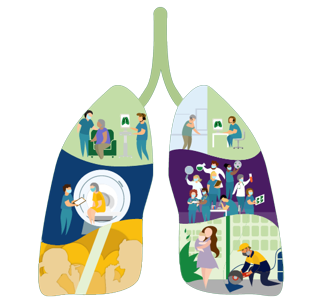Pulmonary rehabilitation
Pulmonary rehabilitation is a supervised medical program that helps people who have lung
diseases live and breathe better. You may need pulmonary rehabilitation if you have a lung disease such as
chronic obstructive pulmonary disease (COPD). During the program, you will learn exercises and breathing
techniques.
Who needs pulmonary rehabilitation?
Your doctor may recommend pulmonary rehabilitation to help you breathe easier and improve
your quality of life for certain lung conditions such as COPD, asthma, pulmonary hypertension, and cystic
fibrosis. It can also improve daily life for people who have scoliosis or other health problems that affect
how well the lungs work.
Your doctor may also recommend pulmonary rehabilitation before and after surgery for a lung
transplant or lung cancer.
What are the benefits?
Pulmonary rehabilitation can help you gain strength, reduce symptoms of anxiety or
depression, and make it easier to manage routine activities, work, and outings or social activities that you
enjoy.
Exercise training
Exercise training aims to strengthen your back, arms, and legs, as well as the muscles you use to breathe.
Training can also help you build stamina and flexibility, making it easier to do everyday tasks and the
things you enjoy.
Your healthcare team may recommend using medicine to open your airways, or they may
recommend adjusting your regular oxygen therapy during physical activity.
Nutritional counseling
You will learn what foods to eat and how to prepare meals to manage your condition and feel your best.
Nutritional counseling can help ensure that you are getting the right nutrients in the proper amounts. A
dietitian may also recommend a weight-loss plan or nutritional supplements or medicines to help you build
muscle.
